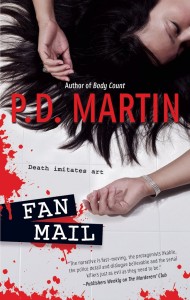Category Archives: FanMail
Prison Letters
Reason to kill?

By P.D. Martin
Today TKZ is thrilled to have a tremendous writer from the land down under join us, author PD Martin. In her latest release, Fan Mail, Aussie FBI profiler Sophie Anderson is working a case where fiction has become fatal. A popular crime writer is murdered and posed just like the crime scene in the dead author’s last book.
Could crime fiction incite someone to kill? This is a question I’m often asked, and it’s one of the themes I explore in my third book, Fan Mail.
Having done lots of research on murder and criminal psychology, my belief is that if someone is going to take another human being’s life, reading fictional accounts of murder is not going to push them over the edge. Having said that, we do live in a world where we’re increasingly exposed to violence and graphic crime-scene depictions.
Take the many successful (and entertaining) shows on TV: CSI, Bones, Law & Order: SVU…and then, of course, there’s Dexter. But have we really been desensitized?
A few years ago, after lots of meticulous research into horrific and violent crimes, I honestly believed I was desensitized, almost in a similar way to a cop. I’d imagined some horrible situations and written about them in detail. I was tough!
Or so I thought, until I met Victoria Police’s profiler, who gave me a list of law-enforcement text books to help with my research. I ordered them online and was so excited when they arrived; and the timing couldn’t have been better because I was packing for a week-long writing retreat. I threw the books in my luggage and headed down to the beach.
The first thing I did when I arrived was to unpack the books and start flipping through one…and then I saw it. The first page the book opened to was a photo from a crime-scene in which a woman had been raped then murdered. The killer had tied her down and posed her in a disturbingly revealing way. Next photo: a dead woman with both of her breasts cut off. Next p hoto: a decomposing body. Next photo…I think you get the picture. In that instant I realised my so-called desensitization wasn’t real. They say a picture tells a thousand words and in the case of crime-scene photographs, it’s certainly true. The new set of books disturbed me, but they also made me understand my character, Aussie FBI profiler Sophie Anderson, so much more intensely – to be faced with these photos every day and go on….it’s definitely one of the hardest jobs in the world.
hoto: a decomposing body. Next photo…I think you get the picture. In that instant I realised my so-called desensitization wasn’t real. They say a picture tells a thousand words and in the case of crime-scene photographs, it’s certainly true. The new set of books disturbed me, but they also made me understand my character, Aussie FBI profiler Sophie Anderson, so much more intensely – to be faced with these photos every day and go on….it’s definitely one of the hardest jobs in the world.
I’m thankful that I write fiction because I can make stuff up and no matter how graphic and horrific, I know it’s not real. And this is also a large part of why I don’t think crime fiction can, or would, incite someone to kill. It is fiction, and no matter how descriptive or well written we know it’s not real. Law-enforcement text books on the other hand…they could be very scary in the wrong hands.
So I’m curious: what do you think? Could reading crime fiction serve as the catalyst for actual crimes?
PD Martin – Phillipa Deanne Martin – is an Australian author with a background in psychology. She has written four novels featuring Aussie FBI profiler Sophie Anderson, of which the first three are currently available in North America – Body Count, The Murderers’ Club and Fan Mail. See www.pdmartin.com.au for more information.

